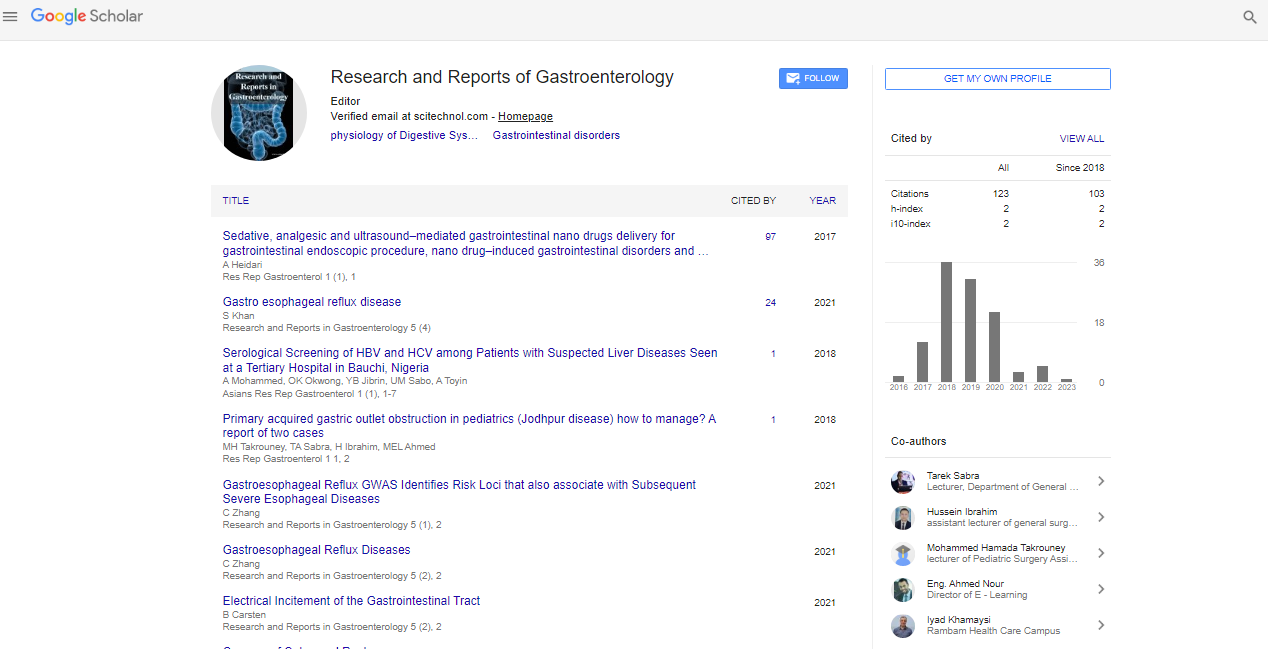Short Communication, Res Rep Gastroenterol Vol: 7 Issue: 3
Enterocolitis: Exploration of a Complex Gastrointestinal Condition
Markel Hosfield*
1Department of Surgery, University of Groningen, Groningen, Netherlands
*Corresponding Author: Markel Hosfield,
Department of Surgery, University of
Groningen, Groningen, Netherlands
E-mail: hosfieldmarkel@gmail.com
Received date: 23 August, 2023, Manuscript No RRG-23-118914;
Editor assigned date: 25 August, 2023, PreQC No RRG-23-118914(PQ);
Reviewed date: 08 September, 2023, QC No. RRG-23-118914;
Revised date: 15 September, 2023, Manuscript No RRG-23-118914 (R);
Published date: 22 September, 2023, DOI: 10.4172/Rrg.1000152
Citation: Hosfield M (2023) Enterocolitis: Exploration of a Complex Gastrointestinal Condition. Res Rep Gastroenterol 7:3.
Description
Enterocolitis is a multifaceted and often poorly understood condition characterized by inflammation of the small and large intestines. It can be caused by a variety of factors, including infections, immune system dysfunction, and underlying medical conditions. This manuscript aims to provide a comprehensive overview of enterocolitis, its causes, symptoms, diagnosis, and treatment options, while highlighting the importance of early detection and management in improving patient outcomes.
Enterocolitis refers to the inflammation of the small intestine (enteritis) and the large intestine (colitis). It is a broad term encompassing various types of enterocolitis, including infectious, ischemic, allergic, and autoimmune forms. Enterocolitis can affect individuals of all ages, from infants to the elderly, and can be a severe and potentially life-threatening condition if left untreated.
Causes
• Infections are a common cause of enterocolitis, often triggered by bacteria, viruses, or parasites. Common pathogens responsible for infectious enterocolitis include Escherichia coli (E. coli), Salmonella, and norovirus.
• Reduced blood flow to the intestines, often due to arterial blockages, can lead to ischemic enterocolitis. This condition is more common in older individuals with vascular disease.
• This form of enterocolitis primarily affects infants and young children. It is often related to food allergies, particularly cow's milk protein allergy. Allergic enterocolitis can cause symptoms such as vomiting, diarrhea, and failure to thrive.
• Autoimmune disorders, such as Crohn's disease and ulcerative colitis, can result in chronic inflammation of the intestines, causing enterocolitis. These conditions involve an overactive immune response targeting the gastrointestinal tract [1-3].
Diagnosis
The diagnosis of enterocolitis involves a combination of clinical evaluation and diagnostic tests. Physicians typically perform the following steps:
• A detailed medical history is essential to identify potential risk factors and the duration and severity of symptoms.
• A thorough physical examination helps to assess the patient's overall health and look for signs of inflammation in the abdomen.
• Stool cultures may be conducted to identify infectious agents. Blood tests can also help in assessing inflammation levels.
• Imaging studies like abdominal X-rays or CT scans may be used to visualize the extent of inflammation and assess complications [4-6].
• In some cases, a colonoscopy or upper endoscopy is performed to directly visualize the intestines and collect tissue samples (biopsy) for further analysis.
Treatment
The treatment of enterocolitis depends on the underlying cause and the severity of the condition. Common treatment approaches include:
• In cases of infectious enterocolitis, management may involve hydration, electrolyte replacement, and rest. Severe cases may require hospitalization.
• Antibiotics are prescribed for bacterial infections, while antiviral or antiparasitic medications may be used for viral or parasitic infections. For autoimmune enterocolitis, immunosuppressive drugs may be prescribed [7].
• Allergic enterocolitis often responds to dietary modifications. Elimination diets can help identify and remove trigger foods, while providing proper nutrition.
• In cases of ischemic enterocolitis or complications of inflammatory bowel diseases, surgical intervention may be necessary to remove damaged tissue or address blockages [8-10].
Enterocolitis is a complex gastrointestinal condition with a range of causes and symptoms. Early diagnosis and appropriate treatment are important for a favorable outcome. Understanding the underlying cause, whether it be infectious, ischemic, allergic, or autoimmune, is essential for tailoring effective treatment strategies. Further research is needed to enhance our understanding of enterocolitis and improve the management of this condition, ultimately leading to better outcomes for affected individuals.
References
- Fitzgibbons SC, Ching Y, Yu D, Carpenter J, Kenny M, et al. (2009) Mortality of necrotizing enterocolitis expressed by birth weight categories. J Pediatr Surg 44(6): 1072–1075.
[Crossref] [Google Scholar] [Indexed]
- Jacob JA (2016) In infants with necrotizing enterocolitis, gut dysbiosis precedes disease. JAMA 315(21): 2264–2265.
[Crossref] [Google Scholar] [Indexed]
- Neu J, Walker WA (2011) Necrotizing enterocolitis. N Engl J Med 364(3): 255–264. .
[Crossref] [Google Scholar] [Indexed]
- Cuna A, Morowitz MJ, Ahmed I, Umar S, Sampath V (2021) Dynamics of the preterm gut microbiome in health and disease. Am J Physiol Gastrointest Liver Physiol 320(4): G411–G419.
[Crossref] [Google Scholar] [Indexed]
- Mai V, Young CM, Ukhanova M, Wang X, Sun Y, et al. (2011) Fecal microbiota in premature infants prior to necrotizing enterocolitis. PLoS one 6(6): e20647.
[Crossref] [Google Scholar] [Indexed]
- Sim K, Shaw AG, Randell P, Cox MJ, McClure ZE, et al. (2015) Dysbiosis anticipating necrotizing enterocolitis in very premature infants. Clin Infect Dis 60(3): 389–397. .
[Crossref] [Google Scholar] [Indexed]
- Wang Y, Hoenig JD, Malin KJ, Qamar S, Petrof EO, et al. (2009) 16S rRNA gene-based analysis of fecal microbiota from preterm infants with and without necrotizing enterocolitis. ISME J 3(8): 944–954. .
[Crossref] [Google Scholar] [Indexed]
- Shelby RD, Raab R, Besner GE, McElroy SJ (2020) Hope on the horizon: Promising novel therapies for necrotizing enterocolitis. Pediatr Res 88(1): 30-34.
[Crossref] [Google Scholar] [Indexed]
- Martin CR, Walker WA (2008) Probiotics: Role in pathophysiology and prevention in necrotizing enterocolitis. Semin Perinatol 32(2): 127-137.
[Crossref] [Google Scholar] [Indexed]
- Thomas CM, Hong T, Pijkeren JP, HemarajataP, Trinh DV, et al. (2012) Histamine derived from probiotic Lactobacillus reuteri suppresses TNF via modulation of PKA and ERK signaling. PLoS one 7(2): e31951.
[Crossref] [Google Scholar] [Indexed]
